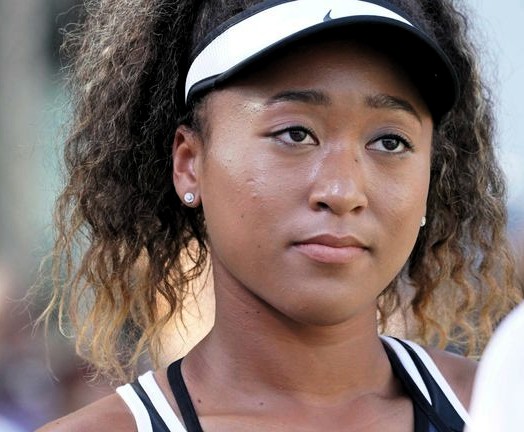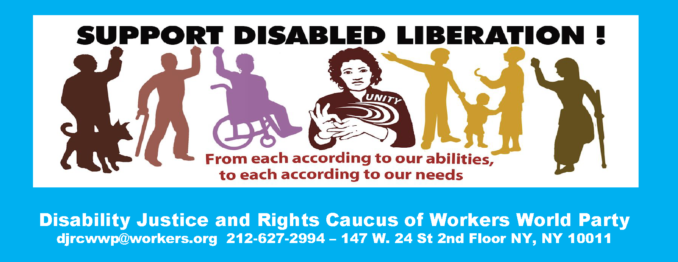

The Disability Justice and Rights Caucus of Workers World Party expresses its unwavering solidarity with tennis player Naomi Osaka.


Once again Osaka has drawn attention to problems so many people face every day. The world’s second-ranked tennis player stated she would not participate in press interviews following her matches at the 2021 French Open because she needs to protect her mental health.
Other athletes have also spoken openly about their struggles with depression, such as National Basketball Association players Kyrie Irving, DeMar DeRozan and Kevin Love, along with Olympic swimming champion Michael Phelps. Osaka is the first major athlete in recent memory to walk away from a tournament to protect her mental health.
The fact that Osaka is considered by many to be the world’s best women’s tennis player has helped elevate the issue of mental health to a major global topic.
Osaka’s decision did not sit well with the French Open officials, who fined her $15,000 for not going to the press room after winning her first match on May 31. They even threatened to disqualify Osaka if she refused to participate in any press briefings. That is when Osaka decided to withdraw entirely from the French Open, rather than let officials deny her control over her life.
Depression affects over 264 million people worldwide. It can be a debilitating condition that makes daily life functions difficult. People with depression often isolate themselves because interactions are so difficult to carry out. Depression takes over your thoughts, your confidence, your willingness to get through the day. Nearly 25 percent of people with depression also suffer from anxiety.
Being “depressed” or “anxious” is often said when feeling sad or nervous. This is not the same as depression that makes you doubt yourself or question your abilities.
Mental illness dates back to 2018
Osaka said she has been dealing with depression since her 2018 U.S. Open win over Serena Williams. That match grew more and more contentious after racist treatment of Williams cost her a point and a game. Post-match press questions also cast doubt on Osaka’s skills and tennis acumen, implying that Serena didn’t lose because Osaka outplayed her.
That kind of hostility can crush anyone. Osaka was 20 years old at the time. She was playing her first major tournament, in which she reached a final in a Grand Slam — one of the four most prestigious tennis tournaments.
It is no surprise that depression took hold and ultimately stayed with Osaka. Serena Williams has also spoken out about her post-partum depression. At the French Open in 2018, she wore a compression suit to prevent more blood clots from forming. This is another time that French Open officials overrode the health of a player. They banned the suit from being worn.
It was only after Naomi Osaka posted a statement detailing more information about her depression, introversion and anxiety, that the French Open officials eased up on their hostility toward her. It was not enough for her to say her mental health had to be protected. They forced her to say more. Having to “prove” your depression, to explain yourself, is a long-standing practice of any boss and far too many doctors. Osaka’s decision not to do press interviews, in order to protect her mental health, should have been respected, not fined.
Tennis has been a growing multibillion-dollar industry since 2016, based on the combined revenue from television and live streaming of the Australian Open, French Open, Wimbledon and the U.S. Open.
Spokesperson for social justice
Naomi Osaka has taken on this money-making machine before. During the global pandemic, three of the four majors went ahead with their tournaments, saying they could not afford to lose so much income.
She spoke frequently about the racism she faces because she is Haitian-Japanese. She has been outspoken against police brutality. When Jacob Blake was paralyzed after being shot seven times in the back by Kenosha, Wis., police, she stepped back from playing in the semi-finals of the Western and Southern Open.
On her Twitter feed, Osaka stated, “I don’t expect anything drastic to happen with me not playing, but if I can get a conversation started in a majority white sport I consider that a step in the right direction. Watching the continued genocide of Black people at the hand of the police is honestly making me sick to my stomach.” (Aug. 27, 2020)
At every U.S. Open game Osaka played in 2020, she wore a mask emblazoned with the name of a Black person killed by cops. The parents of Trayvon Martin and Armaud Arbery publicly thanked Osaka for wearing a mask bearing their murdered sons’ names after she won the U.S. Open.
Naomi Osaka is setting an example of speaking out against racism while defending her mental health needs. In doing so, she becomes a leader for the next generation to demand better treatment and more respect. She can connect to more people through Instagram and Twitter than she can answering the inane and repetitive questions asked in post-match briefings.
It will take getting rid of capitalism and the profit motive that ignores our needs to ultimately build a society that respects the health and well-being of workers and stamps out racism, gender bias, bigotry, hostility to disabled people and all similar oppressions.
As we observe the ongoing negotiations between the United States and Iran, we, the undersigned,…
Hamas issued the following statement on April 24, 2025, published on Resistance News Network. The…
By D. Musa Springer This statement is from Hood Communist editor and organizer D. Musa…
Portland, Oregon On April 12 — following protests in Seattle and elsewhere in support of…
This statement was recently issued by over 30 groups. On Friday, March 28, Dr. Helyeh…
When Donald Trump announced massive tariffs on foreign imports April 2, Wall Street investors saw…